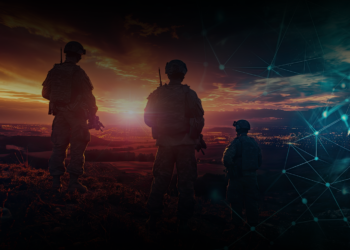Integration of AI in Military Operations
The integration of Artificial Intelligence (AI) in military operations is fundamentally transforming defense strategies across the globe. No longer confined to futuristic fantasy, AI’s role in the military now includes fighting battles, predicting threats, and assisting with complex strategies, making armed forces smarter and more efficient. This transformation is reshaping how military operations are conducted, improving the precision, speed, and effectiveness of defense mechanisms.
Autonomous Vehicles and Drones
One of the most prominent applications of AI in the military is through autonomous vehicles and drones. These unmanned aerial vehicles (UAVs) and ground vehicles are utilized for surveillance, reconnaissance, and combat operations. AI enables these machines to navigate complex terrains, identify targets, and execute missions with minimal human intervention. AI-powered drones can monitor vast areas, detect unusual activities, and provide real-time data to command centers, enhancing both surveillance and combat operations. Additionally, AI-enabled ground vehicles optimize logistics by transporting supplies and equipment, significantly reducing the workload on human soldiers. The ability to perform these tasks autonomously not only increases operational efficiency but also reduces the risk to human lives in dangerous environments.
Enhancing Intelligence, Surveillance, and Reconnaissance (ISR)
Intelligence, Surveillance, and Reconnaissance (ISR) capabilities are also significantly enhanced by AI. By analyzing vast amounts of data from various sensors, satellites, and other sources, AI helps identify patterns, predict potential threats, and provide actionable insights. AI algorithms process and analyze data from multiple sources, offering comprehensive situational awareness, which is critical for effective threat detection and decision support in military operations. The integration of AI in ISR activities allows for quicker response times and more accurate assessments of potential threats, providing a strategic advantage in both offensive and defensive operations.
Strengthening Cybersecurity
Cybersecurity is another crucial area where AI is making significant contributions. With the increasing threat of cyber-attacks, AI plays a pivotal role in protecting military networks and systems. AI algorithms monitor network traffic, identify unusual activities, and detect potential cyber threats in real-time. They also respond to incidents by isolating affected systems and mitigating impacts, while predictive analysis capabilities enable proactive defense measures based on historical data. The ability of AI to rapidly detect and respond to cyber threats ensures that military networks remain secure and resilient against sophisticated attacks.
AI-Driven Predictive Maintenance
AI-driven predictive maintenance systems are transforming the upkeep of military equipment and vehicles. These systems monitor the condition of military assets, predicting failures before they occur, ensuring readiness and reliability. By analyzing data from sensors embedded in equipment, AI predicts potential failures, allowing for timely maintenance and repairs, which reduces downtime and extends the lifespan of military assets. Predictive maintenance not only enhances the operational availability of critical equipment but also optimizes the allocation of maintenance resources, resulting in cost savings and increased efficiency.
Advanced Training and Simulation
Training and simulation for military personnel have also benefited from AI technologies. AI-powered training systems provide realistic combat scenarios, enhancing soldiers’ skills and readiness. These systems monitor and analyze performance, offering feedback and adaptive learning experiences that cater to individual needs, ensuring more effective training outcomes. The use of AI in training simulations allows for the creation of dynamic and varied scenarios that can be tailored to the specific requirements of different units and missions, providing a comprehensive and immersive training experience.
The Human-AI Collaboration Debate
The question of whether AI will replace human soldiers entirely remains a topic of debate. While AI offers numerous advantages such as increased precision, enhanced decision-making, and reduced risk to humans, it also has limitations. AI lacks the human ability to make complex ethical and moral decisions in unpredictable situations, relies heavily on accurate data, and is susceptible to technical failures and cyber-attacks. Thus, the future of military operations is likely to involve collaboration between human soldiers and AI systems, where AI augments human capabilities and improves operational efficiency. This collaboration ensures that the unique strengths of both humans and machines are leveraged to achieve optimal outcomes in military operations.
Examples of AI in Military Applications
Examples of AI in military use are numerous. Project Maven, a U.S. Department of Defense initiative, uses AI to analyze video footage from drones, identifying and classifying objects to enhance surveillance and reconnaissance missions. This project exemplifies how AI can significantly reduce the workload of human analysts and improve the accuracy of threat detection. Autonomous submarines developed by several countries use AI for navigation, surveillance, and combat missions, operating independently to perform tasks such as patrolling and reconnaissance. These submarines represent a significant advancement in naval capabilities, allowing for extended missions without the need for human intervention.
AI-Enhanced Cyber Defense and Logistics
AI-driven cyber defense systems protect military networks from cyber threats by monitoring network traffic, detecting potential threats, and responding to incidents in real-time. These systems enhance the overall cybersecurity posture of military organizations, ensuring that critical information and infrastructure remain protected from malicious activities. AI is also optimizing military logistics by managing supply chains, predicting equipment failures, and optimizing transportation routes. This ensures the efficient movement of supplies and equipment, enhancing operational readiness and reducing logistical bottlenecks.
The Future of AI in Military Training
Additionally, AI-powered training simulations provide realistic combat scenarios and performance analysis, adapting to individual performance for personalized training experiences. These simulations allow military personnel to practice and refine their skills in a controlled environment, improving their preparedness for real-world operations. The use of AI in training also facilitates continuous learning and development, enabling soldiers to adapt to evolving threats and tactics.
Shaping the Future of National Defense
The adoption of AI in military operations is reshaping the landscape of national defense. While AI will not replace human soldiers entirely, it will significantly enhance their capabilities. Human soldiers, supported by AI systems, will form the backbone of future military operations, enabling faster decision-making and more effective force movements. This technological advancement ensures that the military remains prepared for the evolving challenges of modern warfare. By integrating AI into various aspects of military operations, defense organizations can achieve greater efficiency, effectiveness, and strategic superiority, ultimately enhancing national security and protecting the interests of the nation.








